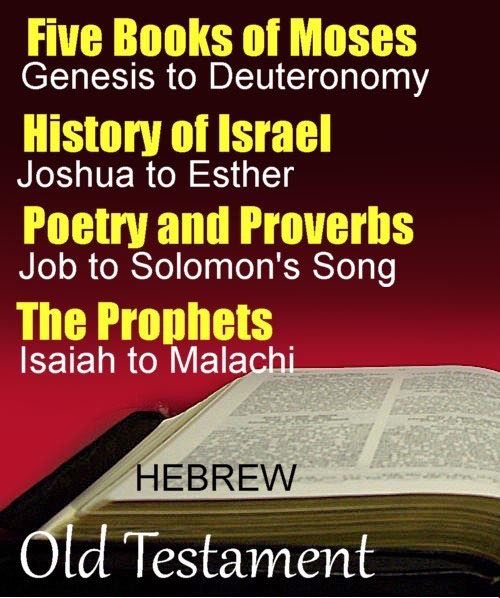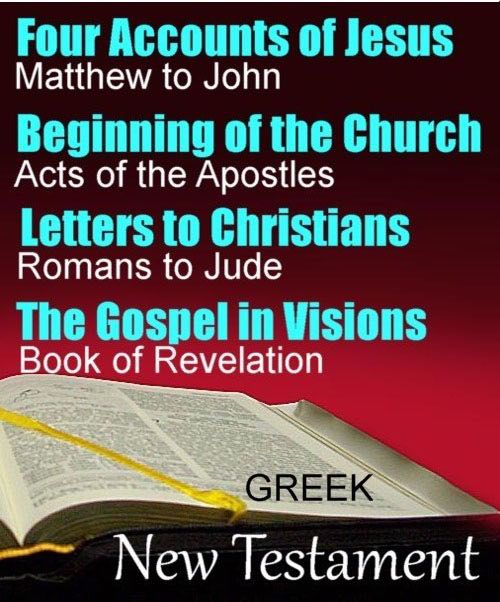
How the Bible is Put Together
—Chart and explanations
The writings included in the Bible come from many different situations over several thousand years, and there are many different kinds of writing, including stories, poems, laws, prophecies, proverbs, and letters.
The theme of the Bible is Jesus Christ. So the best place to begin reading the Bible is where the deeds and teachings of Jesus are recorded —Matthew, Mark, Luke, John, and Acts.
There are 66 separate writings in the Bible, and even some of these are themselves collected writings —for example the “book” of Psalms is actually five books of collected songs.
All this variety of writings can be confusing unless we know how the Bible is put together.

BOOKS OF THE OLD TESTAMENT
Five books of Moses:
Genesis, Exodus, Leviticus, Numbers, Deuteronomy.
History of Israel: Joshua, Judges, Ruth, 1Samuel, 2Samuel, 1Kings, 2Kings, 1Chronicles, 2Chronicles, Ezra, Nehemiah, Esther.
Poetry and Proverbs: Job, Psalms, Proverbs, Ecclesiastes, Song of Solomon.
The Prophets: Isaiah, Jeremiah, Lamentations, Ezekiel, Daniel, Hosea, Joel, Amos, Obadiah, Jonah, Micah, Nahum, Habbakuk, Zephaniah, Haggai, Zechariah, Malachi.

BOOKS OF THE NEW TESTAMENT
Four accounts of Jesus: Matthew, Mark, Luke, John.
Beginning of the Church: Acts of the Apostles.
Letters to Christians: Romans, 1Corinthians, 2Corinthians, Galatians, Ephesians, Philippians, Colossians, 1Thessalonians, 2Thessalonians, 1Timothy, 2Timothy, Titus, Philemon, Hebrews, James 1Peter, 2Peter, 1John, 2John, 3John, Jude.
The Gospel in Visions: Revelation.
1 The Order of the Bible
The Hebrew or Old Testament scriptures were written over a period of 1000 years, from about 3,500 years ago. The Christian or New Testament scriptures were written about 2,000 years ago.
The Bible today has the writings grouped in eight logical categories, while also keeping them generally in chronological (time) order. Being aware of this order and arrangement, you find the Bible much easier to study and understand.
The Two Testaments
The most important division in the Bible is the two testaments, the Old Testament and the New Testament. The Old Testament is not for us to obey anymore. We now obey the New Testament of Jesus Christ. When Jesus died on the cross he cancelled the old law of Moses.
“He has taken it out of the way, having nailed it to the cross” (Colossians 2:13-14). Then his new law (the gospel) came into effect.
However, although we no longer obey its laws but instead obey Jesus, the Old Testament is still important to us. “For whatever things were written before were written for our learning, that we through patience and comfort of the scriptures might have hope” (Romans 15:4).
The Old Testament contains promises of the coming Christ, timeless principles and examples, and history important for our understanding of how God’s plan of salvation unfolded.
2 The Key to the Bible
The New Testament scriptures provide abundant teaching about the Old Testament scriptures. You will find Old Testament passages quoted and explained many times in the New Testament.
Note for example the record of the wonderful sermon that Peter preached at the beginning of Christianity (Acts chapter 2). Observe how Peter quotes from parts of the earlier scriptures, and explains them.
If you browse through the letter to the Hebrews, as another example, you will see how this Christian scripture quotes and explains the Hebrew scriptures.
Taking careful note of all that the New Testament says about the Old Testament, we will see the meaning of the old prophecies and stories in a clear light.
Inspired Interpretation
Peter warns, "No prophecy of scripture is of one's own interpretation, for no prophecy was ever made by human will. Rather, men moved by the Holy Spirit spoke from God" (2Peter 1:20-21).
Peter’s point is that Prophecies spoken by divinely inspired prophets should be interpreted by equally divinely inspired prophets.
The New Testament provides a divinely inspired interpretation of the Old Testament. This is the key to understanding the scriptures.
3 The Theme of the Bible
In the book of Acts, there is a very instructive story. A man is reading his Bible, but finding it difficult to understand. He happened to be reading Isaiah chapter 53.
Philip approached him with the question, "Do you understand what you are reading"? He didn't, so Philip started at that scripture and went through the scriptures and from them he preached Jesus.
The man believed what Philip told him, and asked to be baptized so as to become a Christian. This illustrates that the theme of the Bible is Jesus (Acts 8:26-40).
Jesus Christ is the key to God’s plan for human beings. The Bible from beginning to end reveals how God’s plan has unfolded in Jesus Christ his Son.
Jesus said, "Search the scriptures, for in them you think you have eternal life. It is these scriptures that testify of me" (John 5:39).
I say again, since the theme of the Bible is Jesus Christ, the best place to begin reading the Bible is where the deeds and teachings of Jesus are recorded —Matthew, Mark, Luke, John, and Acts.